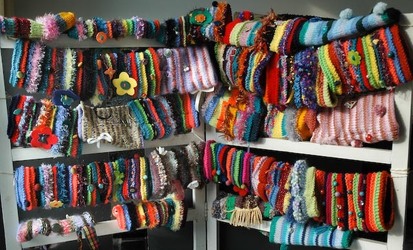
A Twiddlemuff is a knitted muffler, a bit like a cut-off woollen sleeve, which has various small items, such as ribbons, bobbles and buttons, attached to it. Dementia patients often have restless hands and these muffs help to keep those hands occupied, giving patients visual, tactile and sensory stimulation.
After a first batch she knitted was gratefully received at the hospital, it was decided to promote the R D & E’s campaign more widely within Forum via the website and the newsletter.
This led to a number of other members taking up the challenge. Over the winter they have been knitting away, with the result that by the beginning of March we found we had a total of over 30 muffs to donate to the hospital.
We thought this merited meeting hospital staff to make the donation and so an approach was made via one of the contacts named on the hospital's Twiddlemuffs pattern sheet. The upshot of this is that a meeting was set up with the Emergency Department on Friday 4th March to present the muffs to R D & E staff. Forum was represented by Doreen Hart, Zena Worters and Peter Burden. We were met by Dr Gavin Lloyd and Dr Adam Reuben, Consultant Emergency Physicians, Senior Nurse Caroline Dowse, and a number of other members of the hospital's staff.
Prior to the meeting we had been intrigued as to how the hospital's emergency department would use Twiddlemuffs, and we just had to find out how they would be using them. However there is a clear need in relation to patients arriving at A & E severely stressed. Most weeks a small number of patients arrive in this state and they have found that giving them a Twiddlemuff to play with helps a lot in calming them down.
The Emergency Department's staff were pleased to receive our donation, and they were genuinely grateful for all the work put in by those who contributed to our bumper collection.
In passing they suggested one or two further ways in which Forum members may wish to consider helping the A & E service. Firstly they are always on the lookout for volunteers to help those coming into the department, by for example making tea for patients. The other need is for some woollen hats. In the winter months the ambulance crews are quite often called out to patients in the initial stages of hypothermia. A woollen hat can make an important contribution to their recovery.
 RSS Feed
RSS Feed
